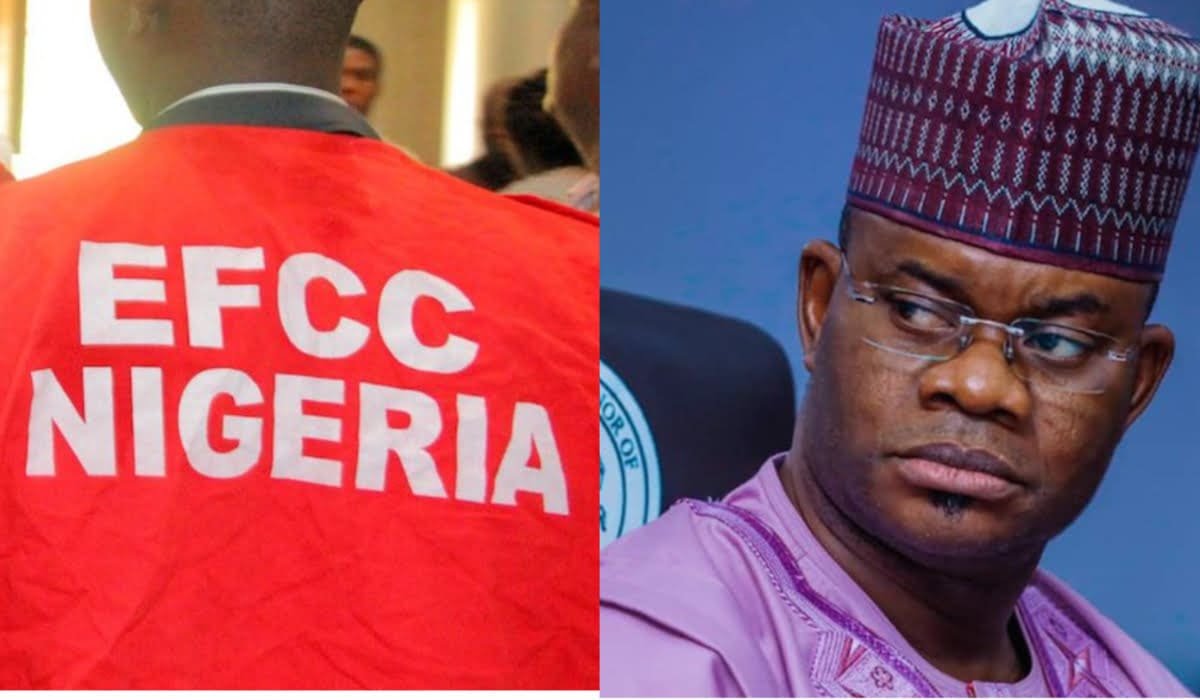
Yahaya Bello Faces Showdown: Court Weighs EFCC’s Bid to Cross-Examine Its Own Witness
The Federal High Court in Abuja has set June 26 as the date to rule on an application filed by the Economic and Financial Crimes Commission (EFCC). The commission seeks permission to cross-examine their own witness, Nicholas Ojehomon, who is involved in the alleged money-laundering case against former Kogi State Governor Yahaya Bello.
Justice Emeka Nwite set the new date following the submissions made by both the EFCC and Yahaya Bello regarding whether it was appropriate for the prosecution to conduct further cross-examination of their own witness, particularly after Attorney Joseph Daudu, SAN, had already conducted the initial cross-examination on behalf of Bello.
A dispute emerged when Daudu strongly contested the method of questioning the witness following the cross-examination conducted by the defense.
Daudu informed Justice Emeka Nwite that the sole course of action for the EFCC was to revisit the testimony of the witness according to legal requirements rather than conducting a cross-examination.
The lead attorney contended that for the EFCC to legally conduct a cross-examination of the witness, the organization must first classify the individual as hostile.
Once the discussion resumed regarding the continued cross-examination, the defense attorney inquired from the witness, Nicholas Ojehomon, if he had previously provided testimony in different courts concerning the payment of school fees by the Bello family to the American International School located in Abuja. The witness confirmed that he had indeed done so.
However, the witness, who was an internal auditor at the American International School in Abuja, stated that they were unable to specify the particular courts involved.
He acknowledged giving testimony in connection with a related accusation involving Ali Bello, but emphasized that he did not make any statements harmful towards ex-Governor Yahaya Bello, just as he hadn’t made any adverse comments about him in this current case.
Once Daudu finished cross-examining the witness, the EFCC attorney, Olukayode Enitan, SAN, proceeded with his own cross-examination focusing on Exhibit 19, which is a copy of the High Court’s judgment from the Federal Capital Territory.
He informed the court that he was not re-examining the EFCC’s witness but rather cross-examining him since the document had been admitted into evidence from the bar during the defense’s cross-examination.
“I am not reviewing him; instead, I am conducting a cross-examination because they presented this document,” he stated.
Nevertheless, the defense attorney pointed out to the court that the request made by the EFCC lawyer was both unfamiliar and inconsistent with legal standards as per the Evidence Act.
“If you wish to cross-examine your own witness, you must first declare them as a hostile witness. Cross examination should not be conducted using documents,” Daudu contended.
Enitan also mentioned that he was entitled to bring certain specified sections of the document to the court’s notice.
At this juncture, the judge inquired, “Is there any statute that backs up your claim?”
“I would like to direct Lordship’s attention to Section 36 of the Constitution. The opposing side attempted to submit this document; we raised objections, but the court decided in their favor. Ensuring fair hearing requires that the complainant also has the right to review this material since Section 36 pertains to the principle of fairness,” replied Pinheiro.
In his reply, Daudu stated, “It’s not that we oppose revisiting the testimony of the witness; this is precisely what Section 36 of the legislation mandates for a fair trial. However, should they intend to conduct a cross-examination, they must provide legal backing for such an action.”
He cannot use the pretense of fair hearing as an excuse to attempt cross-examining the witness.
At the conclusion of the arguments, the judge declined to permit the cross-examination of the witness by the EFCC attorney.
Following this process, the witness provides their initial testimony, after which the defense conducts cross-examination. Subsequently, the prosecution has the opportunity for re-direct examination.
“Respectfully, my stance is as follows: should you all persist with this course of action, please direct your concerns towards me directly, and I will formulate a definitive position,” he declared.
Following the presentation of pros and cons regarding the petition, Justice Nwite scheduled June 26, 27, and July 4, 5 for delivering judgments and resuming the trial.
On Thursday, an EFCC witness testified that no funds were transferred electronically from either the Kogi State government or any of its local governments into the account of the American International School located in Abuja.
He additionally recited a section from an earlier Federal Capital Territory High Court ruling which stated that there was no court directive for the institution to refund the fees to the EFCC, nor had any verdict labeled the funds as proceeds from money laundering.
Bello vs EFCC: Court to Decide on EFCC’s Request to Cross-Examine Its Own Witness
Share this content:





















Post Comment